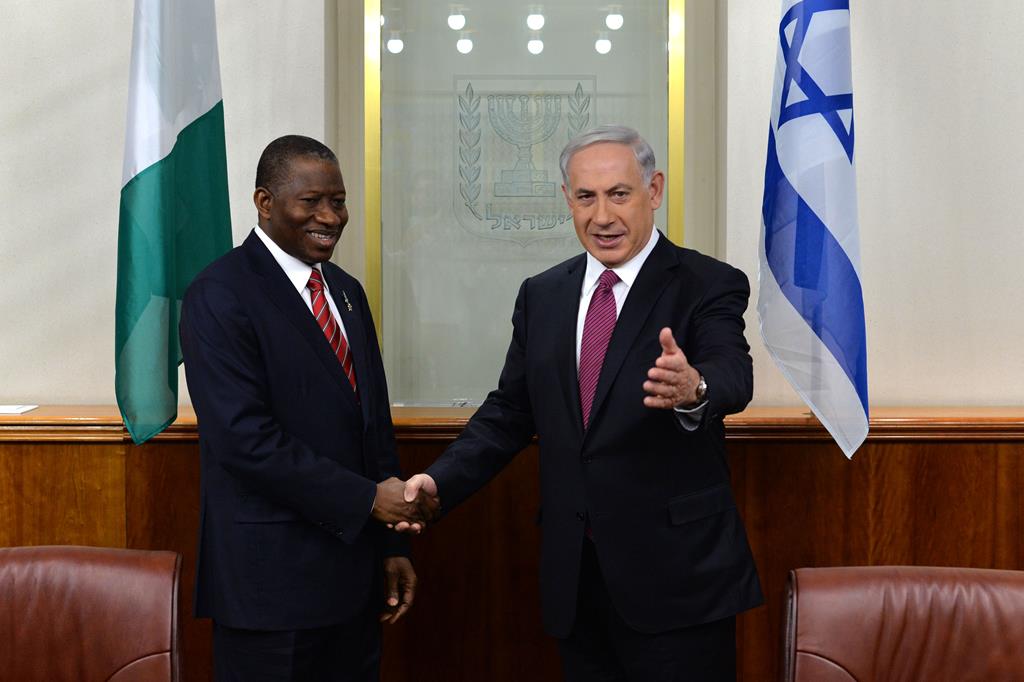African Countries Key in Palestinian Security Council Defeat

The United States and Australia — the only two U.N. Security Council members to vote against the Palestinian resolution — were predictably at the top of Israel’s thank-you list after its one-vote victory margin on Tuesday night.
But two African countries were also high on the list: Nigeria and Rwanda.
Prime Minister Binyamin Netanyahu called the leaders of Rwanda and Nigeria, who abstained in the voting after Netanyahu and U.S. Secretary of State John Kerry convinced them to do so.
There was real drama at the U.N. In the final hours before the vote, culminating months of lobbying on both sides, diplomats were reportedly anticipating that the resolution would get the nine “yes” votes needed to pass — or force a U.S. veto. The U.S. had not promised to use its veto in such a case, and it was generally thought that while it would if necessary, it would only be with considerable reluctance.
But Nigeria, which had been counted on to go with the Palestinians, swung away at the last moment.
In the end, its ambassador, U. Joy Ogwu, accepted the American position, saying the ultimate path to peace lies “in a negotiated solution.”
The U.S. and Australia were the only members casting votes against the resolution, which called for an Israeli withdrawal from Yehudah and Shomron by 2017. Russia, China, France, Luxembourg, Jordan, Argentina, Chile and Chad voted for it. Britain, Nigeria, South Korea, Rwanda and Lithuania all abstained.
Israel has invested in building a good relationship with Nigerian President Goodluck Jonathan, and it seemed to pay off on Tuesday.
At the beginning of December, Netanyahu sent Jonathan a personal letter expressing his “heartfelt condolences” over a terror attack at a mosque in the city of Kano in which at least 120 people were killed. Jonathan visited Israel in late October, with an entourage of 20 Nigerian political and religious leaders.
In 2009, Foreign Minister Avigdor Lieberman went to Ethiopia, Kenya, Ghana, Nigeria and Uganda. Last June, Lieberman returned to the continent and visited Rwanda, Ivory Coast, Ghana, Ethiopia and Kenya. These were the first such visits by an Israeli foreign minister in five decades.
In addition, businessman Hezi Bezalel was credited with an important behind-the-scenes role in securing the African abstentions, according to Arutz Sheva. Bezalel serves as honorary consul of Rwanda in Israel.
U.S. Ambassador to the U.N. Samantha Power said: “We voted against this resolution not because we are comfortable with the status quo. We voted against it because … peace must come from hard compromises that occur at the negotiating table.”
“The United States every day searches for new ways to take constructive steps to support the parties in making progress toward achieving a negotiated settlement,” she added. “The Security Council resolution put before us today is not one of those constructive steps.”
Power described the resolution as “deeply imbalanced and contains many elements that are not conducive to negotiations between the parties, including unconstructive deadlines that take no account of Israel’s legitimate security concerns.”
“The U.S. had a very significant role,” said a high-ranking official at the Foreign Ministry in Yerushalayim. “Not only were they willing to veto, they also worked side-by-side with Israeli diplomats in order to prevent support for the decision within the Security Council. It’s not that they just said they would vote against it. They worked. There were phone calls and messages. The American diplomatic effort is noteworthy.”
Lieberman had scathing words for the Palestinians and their European friends on Wednesday: “The Palestinians’ contempt for the most important states in the international community, first and foremost the United States, stems in part from the support they enjoy from some of the European states. Every state that truly wishes to promote a solution to the conflict must behave responsibly and make it clear to the Palestinians that decisions are made only around the negotiating table.”
Israeli delegate Israel Nitzan said the Palestinians have found every possible opportunity to avoid direct negotiations and brought the council “a preposterous unilateral proposal.”
France was a special source of pique for Israel and was singled out for formal rebuke. The Foreign Ministry has summoned France’s envoy Patrick Maisonnave to its offices in Yerushalayim on Friday to protest its vote in support of imposing a solution on Israel, AFP reported.
French diplomats were known to be working on a more moderately-worded proposal, which the Palestinians ultimately rejected.
This article appeared in print on page 6 of edition of Hamodia.
To Read The Full Story
Are you already a subscriber?
Click "Sign In" to log in!

Become a Web Subscriber
Click “Subscribe” below to begin the process of becoming a new subscriber.

Become a Print + Web Subscriber
Click “Subscribe” below to begin the process of becoming a new subscriber.

Renew Print + Web Subscription
Click “Renew Subscription” below to begin the process of renewing your subscription.












